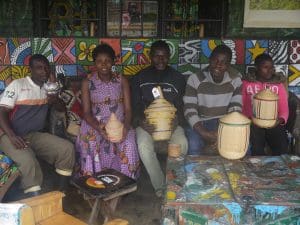 The tagline at the Red Rocks Cultural Centre in Musanze district, northern Rwanda, summarizes it all: “Where intercultural exchange leads to community development.”
The tagline at the Red Rocks Cultural Centre in Musanze district, northern Rwanda, summarizes it all: “Where intercultural exchange leads to community development.”
Indeed, no talk about Red Rocks is ever complete without making mention of that which is at the very heart of its existence and its soul –the surrounding local community. This is in tandem with Rwanda’s overall development blueprint, which places a high premium on tourism, conservation, and the community.
It is this philosophy that is at the heart of Red Rock’s ever-growing portfolio of signature community development initiatives, which all aim at advancing economic, social and environmental benefits for some of the most vulnerable people among Red Rock’s host community.
It is therefore no coincidence that most of the community development programs at Red Rocks specifically target the youth and vulnerable women. The rationale therein is that, by empowering ordinary rural folk and introducing them to the tourism value chain, awareness is created about conservation measures and the importance of natural habitats not only for animals but also the local communities residing around the national parks.
At the rustic and artsy Red Rocks Stone Rock Club, one will find a creative mix of educative and entertaining (edu-tainment) programs running through the week. Here, the focus is on conservation awareness and education through screenings of wildlife and nature films and documentaries. The screening sessions are a cordial affair, usually followed promptly with pertinent open discussions and reflections. The screenings typically gather not just community members but also other targeted niche groups like student, church and conservation groups.
For those intent on learning a skill or a craft while at Red Rocks, the options are limitless and range from basket weaving lessons referred to fondly as Agaseke Handicrafts Lessons, where the women from the local crafts coop take curious tourists through the paces of weaving and basketry.
This is particularly a hit with female tourists, but occasionally you will find the odd goofy male at it, too.
For many tourists though, the best experience is the prospect of brewing their own local banana or sorghum beer from scratch, right from peeling the ripe plantains, to mashing it up with dry grass in huge wooden planks, to savoring its taste, all with the guidance of Red Rock’s banana beer-making gurus.
The banana beer experience is usually festive-like, with music and dance lending the perfect backdrop to it.
If still hungry for relics of traditional Rwandan living, you could just get down on your knees for a hands-on, fun experience grinding millet and sorghum on a traditional grinding stone.
At the Red Rocks Art Center, a cohort of talented and ever smiling visual artists led by Zulu Bob are on hand to serve you in more ways than one; sell you exquisite hand-crafted jewelry, paintings, trinkets, etc. on fair trade terms. What’s more, Zulu and his team have no qualms introducing your toddler to the ABCs of painting, with the prospect of your seven-year-old walking away with their own art piece.
If you like the buzz of bees, or the richness of pure unadulterated honey, the bee hive experience at Red Rocks will introduce you to the various small apiculture cooperatives that operate out of the villages around Red Rocks.
The sight of traditional bee hives hoisted up in tree canopies and swampy areas is a common one even at Red Rocks of late. Here, the locals will introduce you to the art of apiculture, and the various medicinal and nutritional uses of honey.
Alternatively, you could just melt into the community for a friendly overnight home stay with a Rwandan host family. This is the best way to get a sneak peek into Rwandan country life, do some gardening, get involved in preparing your own meals, take village walks and experience traditional village life in the countryside.
For more information about these programs, contact [email protected] or call +250 789 254 315
Source: Travel Wire News



